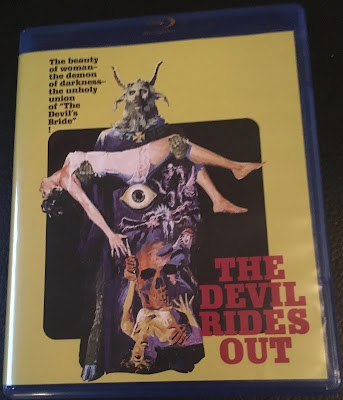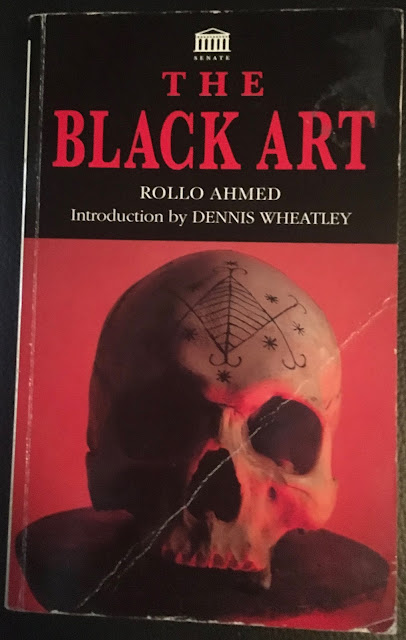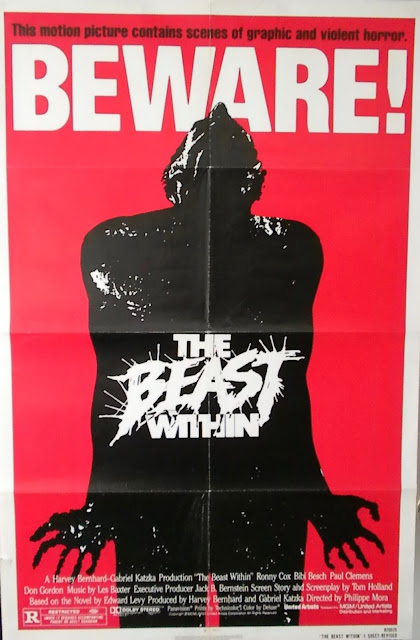The Devil Rides Out- U.S. Blu-ray Release and the Occult Roots of the Novel Version
Finally, the 1968 Hammer Films classic, The Devil Rides Out, has gotten a Blu-ray release in the U.S. This release is courtesy of the folks at Shout Factory/Scream Factory.
There are two versions of the film included on the disc: the original version as released in the U.S. (including the alternate title of The Devil's Bride) and there is also the revamped version Hammer released in the U.K. with the modified special effects. Obviously, making changes to an old movie is a contentious issue, so it is a good move to have both versions, rather than just choosing one or the other. For those who are curious to see the enhanced effects, it is there, but at the same time, you aren't stuck with it if you don't like it. There is still the regular version to watch.
Much of the bonus stuff is carried over from some previous releases, such as the audio commentary featuring Christopher Lee, plus some featurettes from the Hammer Blu-ray/DVD release. In addition to these items, there is also a new audio commentary. One element that I am very happy about with Shout/Scream Factory's releases, in general, is the usage of old theatrical poster and video box artwork, rather than just slapping some generic garbage on there. Even when there is a new piece of art, there is usually the option for a classic piece of art as well.
In a related topic to The Devil Rides Out, I would like to write a bit about a few people who helped shape the original novel that is the basis for the movie. I am referring to three different occultists Dennis Wheatley spoke with as he prepared to write the book.
The most infamous of these would be Aleister Crowley, who was in his later years by the time he and Wheatley crossed paths. To this day, Crowley is one of the most prominent figures in the world of occultism, both loved and hated in likely equal measure. As it is generally related, Crowley and Wheatley had lunch together, seemingly getting along quite well. Wheatley not only used information, such as terminology, he got from Crowley, including the magical grades (i.e. Ipsissimus), but he also based the novel's villain, Damien Mocata, on him.
The other notorious character Wheatley consulted was actually on the other end of the spectrum from Crowley-- the rather eccentric Montague Summers. Summers wrote a number of books on a fairly wide array of topics from gothic novels and plays to vampires, werewolves, and black magic. Summers fashioned himself as an old-fashioned (even in those days) clergyman. Today, many people dismiss his works, sometimes accusing him of just making crazy things up, which is a bit unfair. In fact, Summers was a very scholarly author, leading to extensive notations of sources in his works as well as numerous quotes in languages such as German, Latin, French, etc. yet rarely, if ever supplying any translation. He determined his audience would naturally know all of those languages and be able to understand the quotes as easily as they would the rest of the text. The issue is that the sources he used are obviously flawed (i.e. records of confessions made under torture). Wheatley seemed to find him a rather distasteful person, for the most part. As he had done with Crowley, Wheatley later based a character on Summers, Canon Copely-Syle from To the Devil-- a Daughter.
The third person I want to mention is the least known of the three, but was probably a bit more closely linked to Wheatley himself. I am referring to a fairly obscure occultist by the name of Rollo Ahmed. Apparently, Ahmed had instructed Wheatley and his wife in yoga at one point, making him a natural source for information when writing The Devil Rides Out. After the tremendous success of the novel, Wheatley was asked to write a reference book on the occult, but declined, feeling that he did not have the necessary knowledge at the time to write such a book. He did, however, recommend Rollo Ahmed as a much better choice for the project, and so, in 1936, Rollo Ahmed's The Black Art saw the light of day.
It is not altogether clear if Wheatley based any character on Ahmed, but it is certainly a possibility. For me, the most likely candidate would be a character from Strange Conflict. Ahmed was an interesting, if obscure person. He got into trouble for fraud, for instance, and also appeared in a newspaper article about black magic wearing a mask over the upper part of his face.
If you are interested in learning more about Rollo Ahmed, there is a two-part article about him in The Fortean Times from a few years back that is quite interesting.
 |
| U.S. Blu-Ray release from Scream Factory |
There are two versions of the film included on the disc: the original version as released in the U.S. (including the alternate title of The Devil's Bride) and there is also the revamped version Hammer released in the U.K. with the modified special effects. Obviously, making changes to an old movie is a contentious issue, so it is a good move to have both versions, rather than just choosing one or the other. For those who are curious to see the enhanced effects, it is there, but at the same time, you aren't stuck with it if you don't like it. There is still the regular version to watch.
Much of the bonus stuff is carried over from some previous releases, such as the audio commentary featuring Christopher Lee, plus some featurettes from the Hammer Blu-ray/DVD release. In addition to these items, there is also a new audio commentary. One element that I am very happy about with Shout/Scream Factory's releases, in general, is the usage of old theatrical poster and video box artwork, rather than just slapping some generic garbage on there. Even when there is a new piece of art, there is usually the option for a classic piece of art as well.
In a related topic to The Devil Rides Out, I would like to write a bit about a few people who helped shape the original novel that is the basis for the movie. I am referring to three different occultists Dennis Wheatley spoke with as he prepared to write the book.
The most infamous of these would be Aleister Crowley, who was in his later years by the time he and Wheatley crossed paths. To this day, Crowley is one of the most prominent figures in the world of occultism, both loved and hated in likely equal measure. As it is generally related, Crowley and Wheatley had lunch together, seemingly getting along quite well. Wheatley not only used information, such as terminology, he got from Crowley, including the magical grades (i.e. Ipsissimus), but he also based the novel's villain, Damien Mocata, on him.
The other notorious character Wheatley consulted was actually on the other end of the spectrum from Crowley-- the rather eccentric Montague Summers. Summers wrote a number of books on a fairly wide array of topics from gothic novels and plays to vampires, werewolves, and black magic. Summers fashioned himself as an old-fashioned (even in those days) clergyman. Today, many people dismiss his works, sometimes accusing him of just making crazy things up, which is a bit unfair. In fact, Summers was a very scholarly author, leading to extensive notations of sources in his works as well as numerous quotes in languages such as German, Latin, French, etc. yet rarely, if ever supplying any translation. He determined his audience would naturally know all of those languages and be able to understand the quotes as easily as they would the rest of the text. The issue is that the sources he used are obviously flawed (i.e. records of confessions made under torture). Wheatley seemed to find him a rather distasteful person, for the most part. As he had done with Crowley, Wheatley later based a character on Summers, Canon Copely-Syle from To the Devil-- a Daughter.
The third person I want to mention is the least known of the three, but was probably a bit more closely linked to Wheatley himself. I am referring to a fairly obscure occultist by the name of Rollo Ahmed. Apparently, Ahmed had instructed Wheatley and his wife in yoga at one point, making him a natural source for information when writing The Devil Rides Out. After the tremendous success of the novel, Wheatley was asked to write a reference book on the occult, but declined, feeling that he did not have the necessary knowledge at the time to write such a book. He did, however, recommend Rollo Ahmed as a much better choice for the project, and so, in 1936, Rollo Ahmed's The Black Art saw the light of day.
 | |||||||
| Paperback edition of Rollo Ahmed's The Black Art |
 |
| First edition, minus the dustjacket, of The Black Art |
If you are interested in learning more about Rollo Ahmed, there is a two-part article about him in The Fortean Times from a few years back that is quite interesting.



Comments
Post a Comment